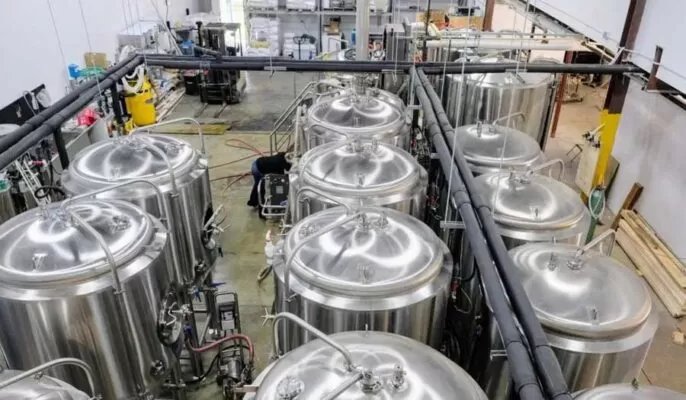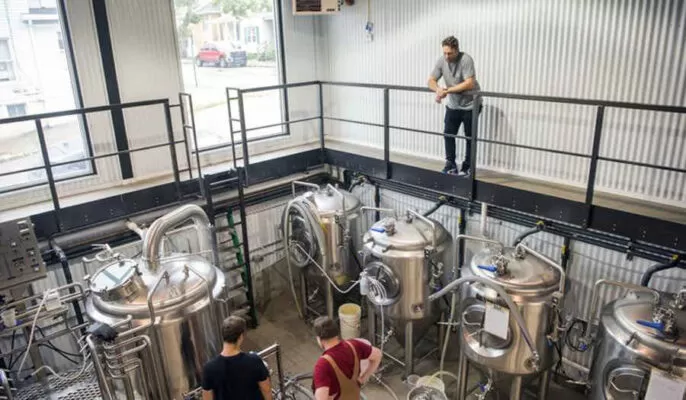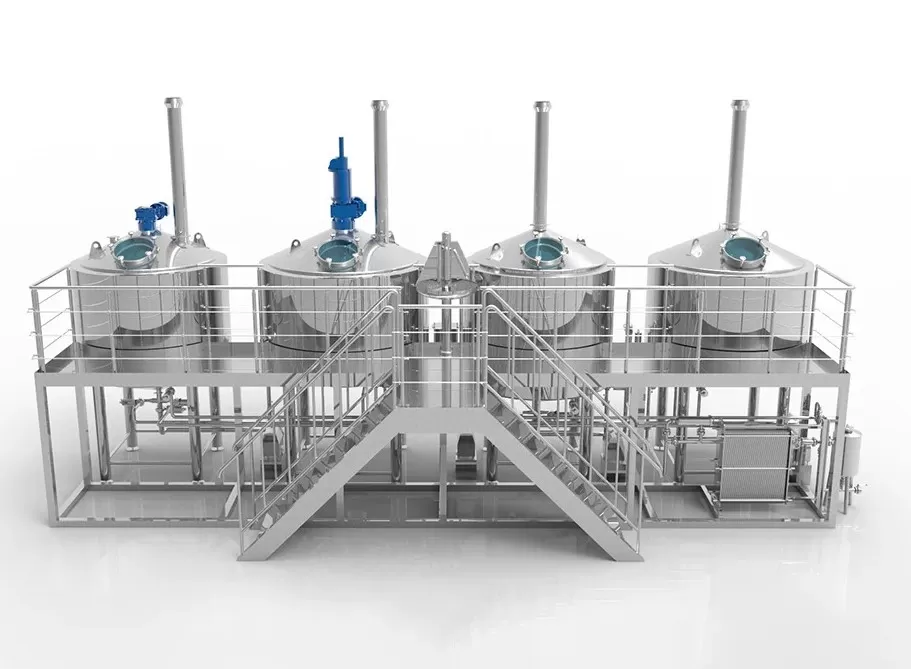What is Commercial Kombucha Brewing Equipment?
Commercial kombucha brewing equipment refers to the machinery and tools used in the production of kombucha on a large scale. Kombucha is a fermented tea that has gained popularity due to its purported health benefits. This equipment is designed to optimize the fermentation process, allowing manufacturers to produce consistent and high-quality kombucha for distribution. The equipment varies from fermentation tanks, bottling lines, heat exchangers, and pH meters to other accessories necessary for commercial production.
Types of Commercial Kombucha Brewing Equipment
The equipment range includes, but is not limited to:
- Fermentation Tanks: Stainless steel vessels used for fermenting tea and sugar with SCOBY (symbiotic culture of bacteria and yeast).
- Bottling Lines: Machinery for filling, capping, and labeling kombucha bottles.
- Heat Exchangers: Used to cool down the kombucha after fermentation to halt the fermentation process.
- pH Meters: To ensure the acidity level of kombucha is within the desired range.
The Functionality of Brewing Equipment
The main functions of this equipment are:
- Fermentation Control: Providing a controlled environment for the kombucha to ferment properly.
- Temperature Regulation: Ensuring the kombucha is fermented at the correct temperature.
- Aseptic Processing: Keeping the kombucha free from contaminants during bottling.
- Scalability: Allowing producers to scale their operations according to demand.
Applications in the Kombucha Brewing Process
This equipment is crucial at various stages:
- Preparation: Brewing the tea and mixing with sugar.
- Fermentation: Fermenting the tea with SCOBY.
- Filtration: Removing any solids or residues.
- Bottling: Filling the kombucha into bottles for sale.
The Benefits of Using Proper Equipment
Using appropriate commercial kombucha brewing equipment can:
- Enhance the quality and taste of the kombucha.
- Increase the efficiency of the brewing process.
- Provide consistency in product output.
- Help in meeting regulatory standards for commercial beverages.
Choosing the Right Equipment
To choose the right equipment, one must consider:
- Production Capacity: How much kombucha you plan to produce.
- Space: The amount of space available for the equipment.
- Budget: How much you’re willing to invest in the equipment.
- Features: What specific features you need, like automation or specific material builds.
How Much Does Commercial Kombucha Brewing Equipment Cost?
Commercial kombucha brewing equipment represents a significant investment for any business venturing into the kombucha market. The cost can vary widely based on the scale of production, the quality of the machinery, and additional features that enhance automation and efficiency. To provide a clearer picture of the potential financial commitment involved, a detailed exploration will be presented in an eight-paragraph article, complete with markdown formatting, lists, and tables to deliver the information in a structured and reader-friendly format. Specific brands and their price ranges will be offered to assist in budgeting and decision-making for prospective kombucha brewers.
Exploring the Types of Commercial Kombucha Brewing Equipment
Understanding the Range of Equipment
The types of commercial kombucha brewing equipment encompass a variety of machines and tools essential for different stages of production. The complexity of equipment can range from basic brewing vessels to sophisticated bottling and carbonation systems. This diversity allows producers to scale their operations based on their specific needs and production targets.
Key Equipment Types
Commercial kombucha brewing setups typically include several key types of equipment:
- Brewing Vessels: These are often stainless steel tanks designed for the initial brewing and fermentation stages.
- Fermentation Tanks: Specific tanks where the brewed tea is combined with a SCOBY and left to ferment.
- Cooling Systems: Used to control the temperature during and after fermentation.
- Filtration Systems: These help clarify the kombucha before bottling.
- Carbonation Units: For adding fizz to the kombucha if required.
- Bottling Lines: Automated systems for filling, capping, and labeling the final product.
Pricing Overview
Prices for commercial kombucha brewing equipment vary depending on size, functionality, and automation level. Here’s a simplified table illustrating the price range for different types of equipment:
| Equipment Type | Price Range |
|---|---|
| Brewing Vessels | $1,000 – $5,000 |
| Fermentation Tanks | $2,000 – $10,000 |
| Cooling Systems | $500 – $4,000 |
| Filtration Systems | $1,000 – $5,000 |
| Carbonation Units | $2,000 – $6,000 |
| Bottling Lines | $10,000 – $50,000 |
Factors Influencing Price
The cost can be influenced by several factors, such as:
- Capacity: Larger tanks and systems cost more due to the materials and design complexity.
- Material Quality: Equipment made from higher-grade materials, like 316 stainless steel, will be more expensive.
- Automation: Fully or semi-automated systems can significantly increase the price.

Functions of Commercial Kombucha Brewing Equipment
The Role of Brewing Equipment in Kombucha Production
Commercial kombucha brewing equipment plays a critical role in ensuring a high-quality and scalable production process. Each piece of equipment is designed to perform specific functions that contribute to the overall efficiency and effectiveness of the brewing operation.
Fermentation
One of the primary functions of kombucha brewing equipment is to provide an optimal environment for fermentation. The equipment is designed to maintain the ideal temperature and pH balance, which are critical for the SCOBY (symbiotic colony of bacteria and yeast) to thrive and produce the desired flavors and carbonation levels.
- Fermentation Tanks: These are designed to be airtight to prevent contamination and often include features for temperature control.
- pH Monitoring: Maintaining the correct acidity levels is crucial for safety and flavor profile, and pH meters are a common component of the brewing setup.
Temperature Control
Temperature control is another vital function of kombucha brewing equipment. The fermentation process of kombucha is highly temperature-sensitive.
- Cooling Systems: These can range from basic cooling jackets to sophisticated glycol systems that ensure the kombucha is fermented at consistent temperatures to prevent over-fermentation or spoilage.
Filtration
After fermentation, the kombucha must be filtered to remove any residual yeast or sediment before it can be bottled and carbonated.
- Filtration Systems: These systems can vary from simple mesh filters to more complex micro-filtration systems designed to clarify the kombucha without affecting its taste or carbonation levels.
Carbonation
While kombucha naturally develops carbonation during fermentation, additional carbonation may be added to meet consumer preferences.
- Carbonation Units: These precisely control the amount of carbon dioxide infused into the kombucha, ensuring a consistent and desirable level of fizziness.
Bottling and Packaging
The final stage of kombucha production is bottling, which must be done in a sanitary manner to maintain product quality.
- Bottling Lines: These automated systems can fill, cap, and label bottles at high speeds, ensuring a clean and efficient packaging process.
Sanitation
Maintaining cleanliness is crucial in kombucha production to prevent contamination.
- CIP (Clean-In-Place) Systems: Many pieces of kombucha brewing equipment include CIP systems to automate the cleaning process, thus maintaining high standards of hygiene.
Automation and Control
Finally, many systems are designed to automate the brewing process, ensuring consistency and reducing labor costs.
- Control Systems: These can range from simple temperature and pump controls to fully automated brewing systems that manage every aspect of production.
Each of these functions is critical to the commercial production of kombucha, helping producers meet demand, maintain quality, and scale their operations efficiently. As the industry grows, the technology behind these systems continues to evolve, making the process more accessible and streamlined.
How Commercial Kombucha Brewing Equipment Benefits You
Boosting Production Efficiency
Commercial kombucha brewing equipment is specifically designed to streamline the production process. This efficiency is achieved through the automation of repetitive tasks such as bottling, capping, and labeling, which significantly speeds up production times and reduces labor costs.
Consistency in Kombucha Quality
Quality control is essential in kombucha production. Commercial equipment ensures consistent temperature, pH levels, and carbonation during each batch, which is crucial for producing a kombucha that meets the same standard every time.
Scaling Production to Demand
With commercial brewing equipment, businesses can scale their kombucha production up or down without compromising on quality. This flexibility is key to managing supply in line with fluctuating market demands.
Enhancing Flavor Profiles
Precise control over the brewing environment allows for the development of specific flavor profiles. Equipment like temperature-controlled fermentation tanks can help in achieving the desired taste and quality of kombucha.
Reducing Contamination Risks
Commercial equipment is designed to be easily cleaned and sanitized, minimizing the risk of contamination. Clean-in-place (CIP) systems and food-grade materials used in commercial kombucha brewing equipment ensure a sanitary production process, which is vital for a beverage like kombucha.
Maximizing Return on Investment
While the initial investment may be significant, the long-term benefits of using commercial kombucha brewing equipment include reduced manpower, lower production costs, and increased capacity, all of which contribute to a better return on investment.
Sustainability and Energy Efficiency
Modern commercial brewing equipment often incorporates energy-efficient designs and sustainable materials, reducing the ecological footprint of the brewing operation and potentially lowering energy costs in the long term.
Where to Buy Commercial Kombucha Brewing Equipment
Online Marketplaces and Specialized Vendors
When looking to purchase commercial kombucha brewing equipment, one of the primary resources are online marketplaces. Platforms such as Alibaba, ThomasNet, and Kinnek allow buyers to compare different products and vendors. These marketplaces often provide customer reviews and ratings which can help in making an informed decision.
Direct Purchases from Manufacturers
Purchasing directly from manufacturers can sometimes offer cost savings, as it cuts out the middleman. Many manufacturers also provide customizations and additional services like installation, training, and after-sales support.
Industry Trade Shows and Exhibitions
Trade shows and exhibitions offer a unique opportunity to see the equipment firsthand, talk directly with the manufacturers, and even witness demonstrations of the machinery in action. This can be invaluable in assessing the quality and suitability of the equipment for your specific needs.
Local Distributors and Resellers
Local distributors and resellers can be beneficial, especially for after-sales service and parts. They might have established relationships with manufacturers and can provide on-site services and quicker response times for any issues that may arise.
Used Equipment Platforms
There are platforms and forums for used brewing equipment, which can be a cost-effective option. However, when buying used, it’s crucial to thoroughly inspect the equipment and understand its history and condition.
Considerations for Purchase
When deciding where to buy, consider factors such as warranty, customer service, lead time, and the credibility of the supplier. It’s also important to ensure that the equipment meets any necessary certifications or standards required in your region.
Product Advantages of Chinese Commercial Kombucha Brewing Equipment
Cost-Effectiveness
Chinese manufacturing has a reputation for being cost-effective. Chinese-made commercial kombucha brewing equipment is often more affordable than its Western counterparts, making it an attractive option for many businesses looking to maximize their budget.
Technological Innovations
Many Chinese manufacturers are at the forefront of technological innovation in brewing equipment. They incorporate advanced features into their designs, such as sophisticated control systems and automation, which can enhance the brewing process.
Customization
Chinese manufacturers offer a high degree of customization, allowing brewers to tailor equipment to their specific needs. This flexibility can lead to more efficient production and a better end product.
Growing International Presence
Chinese brewing equipment manufacturers are expanding their international presence, making it easier to obtain their products and access support globally. They are increasingly aware of international standards and work to ensure their equipment meets these requirements.
Micet Group: A Profile of Excellence
Micet Group stands out as a China-Canada cooperative brewery equipment manufacturer. The company’s commitment to the craftsman spirit and strict quality control ensures that their high-end product line meets and exceeds customer expectations. Their focus on innovation and superb craftsmanship has earned them a reputation that attracts a global clientele.
Commitment to Quality and Delivery
Micet’s dedication to quality extends through their rigorous process testing in production, ensuring that the equipment not only functions well but also arrives on time. This reliability in both product quality and delivery schedules sets them apart in the industry.

Best Chinese Supplier of Commercial Kombucha Brewing Equipment: Micet Group
Established Expertise
Micet Group’s expertise is built on a foundation of China-Canada collaboration, highlighting their global approach and understanding of different market needs. Their specialization in research and development positions them as a leader in the brewing equipment manufacturing industry.
Customer-Centric Approach
With a distribution and partnership system designed to serve the global brewing market, Micet Group prioritizes the customer experience. Their focus on meeting customer expectations for equipment quality exemplifies their customer-centric approach.
Quality as a Hallmark
The craftsman spirit is at the heart of Micet Group’s operation, ensuring strict quality control and process testing. This attention to detail in production underscores their commitment to delivering only the best equipment.
Global Recognition
Micet’s capabilities in innovation and craftsmanship have not gone unnoticed. They have successfully attracted an international customer base, cementing their status as a company on its way to becoming a benchmark in the global market.
The Micet Promise
Micet Group’s dedication to being a benchmarking company is evident in their meticulous production processes and the innovative capabilities that meet the evolving demands of the brewing industry. Their efforts ensure that customers worldwide receive nothing short of excellence.
FAQ
What is the average lifespan of commercial kombucha brewing equipment?
The average lifespan of commercial kombucha brewing equipment varies depending on the material, usage, and maintenance practices, but generally, high-quality stainless steel equipment can last 10-20 years with proper care.
Can kombucha brewing equipment be used for other types of fermentation?
Yes, kombucha brewing equipment can often be used for other types of fermentation. Its versatile design is suitable for brewing a variety of fermented beverages, but it’s important to ensure compatibility and cleanliness between batches.
What are the most critical components of kombucha brewing equipment to maintain?
The most critical components to maintain are the fermentation tanks, cooling systems, and any parts that come into direct contact with the kombucha to prevent contamination. Regular inspections and maintenance of seals, valves, and gauges are also essential.
How often should commercial kombucha brewing equipment be cleaned?
Commercial kombucha brewing equipment should be cleaned after every batch or more frequently if it’s used continuously. It’s crucial to follow a thorough cleaning and sanitation process to maintain product quality and safety.
Is it necessary to have training to operate commercial kombucha brewing equipment?
Yes, proper training is necessary to operate commercial kombucha brewing equipment safely and effectively. This includes understanding the brewing process, equipment functions, safety protocols, and maintenance procedures.
What safety measures should be in place when operating kombucha brewing equipment?
Safety measures should include proper personal protective equipment (PPE), knowledge of emergency shut-off procedures, regular equipment checks, and a clear understanding of the chemical handling used in the cleaning processes.
Can commercial kombucha brewing equipment be automated?
Many modern commercial kombucha brewing systems come with options for automation to varying degrees, from temperature control to full-scale production automation, which can help to increase efficiency and consistency in the brewing process.



